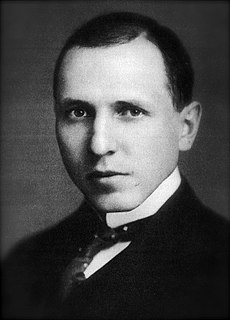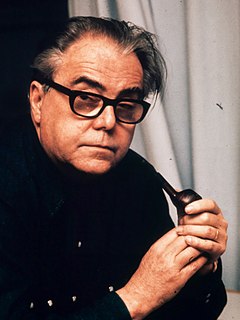A Quote by Mahatma Gandhi
Study not man in his animal nature - man following the laws of the jungle - but study man in all his glory.
Related Quotes
How shall we define occultism? The word is derived from the Latin occultus, hidden; so that it is the study of the hidden laws of nature. Since all the great laws of nature are in fact working in the invisible world far more than in the visible, occultism involves the acceptance of a much wider view of nature than that which is ordinarily taken. The occultist, then, is a man who studies all the laws of nature that he can reach or of which he can hear, and as a result of his study he identifies himself with these laws and devotes his life to the service of evolution.
One of the most revolutionary concepts to grow out of our clinical experience is the growing recognition that innermost core of man's nature - the deepest layers of his personality, the base of his 'animal nature' - is basically socialized, forward-moving, rational and realistic... He is realistically able to control himself, and he is incorrigibly socialized in his desires. There is no beast in man, there is only man in man.
I believe that the unity of man as opposed to other living things derives from the fact that man is the conscious life of himself. Man is conscious of himself, of his future, which is
death, of his smallness, of his impotence; he is aware of others as others; man is in nature, subject to its laws even if he transcends it with his thought.
Secondly, man sins against nature when he goes against his generic nature, that is to say, his animal nature. Now, it is evident that, in accord with natural order, the union of the sexes among animals is ordered towards conception. From this it follows that every sexual intercourse that cannot lead to conception is opposed to man's animal nature.
No Senses stronger than his brain can bear. Why has not Man a microscopic eye? For this plain reason, Man is not a Fly: What the advantage, if his finer eyes Study a Mite, not comprehend the Skies?... Or quick Effluvia darting thro' his brain, Die of a Rose, in Aromatic pain? If Nature thunder'd in his opening ears, And stunn'd him with the music of the Spheres... Who finds not Providence all-good and wise, Alike in what it gives, and what denies?
Since my first discussions of ecological problems with Professor John Day around 1950 and since reading Konrad Lorenz's "King Solomon's Ring," I have become increasingly interested in the study of animals for what they might teach us about man, and the study of man as an animal. I have become increasingly disenchanted with what the thinkers of the so-called Age of Enlightenment tell us about the nature of man, and with what the formal religions and doctrinaire political theorists tell us about the same subject.
If Montaigne is a man in the prime of life sitting in his study on a warm morning and putting down the sum of his experience in his rich, sinewy prose, then Pascal is that same man lying awake in the small hours of the night when death seems very close and every thought is heightened by the apprehension that it may be his last.
Literary men now routinely tell their readers about their divorces. One literary man who reviews books wrote, in reviewing a study of Ruskin, that he had never read a book by Ruskin but that the study confirmed him in his belief that he didn't want to read a book by Ruskin. This man very often writes about his family life.
I think men of science as well as other men need to learn from Christ, and I think Christians whose minds are scientific are bound to study science that their view of the glory of God may be as extensive as their being is capable. But I think that the results which each man arrives at in his attempts to harmonize his science with his Christianity ought not to be regarded as having any significance except to the man himself, and to him only for a time, and should not receive the stamp of a society.









































